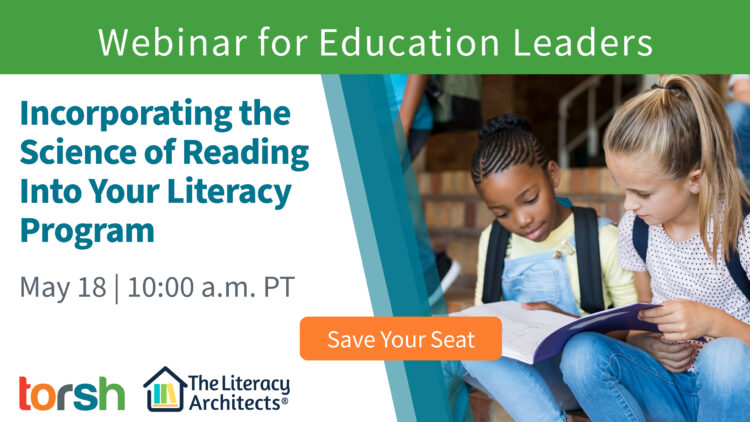[On-Demand Webinar with Q&A] Unlocking the Power of the Reading Brain
We recently wrapped a webinar for school and district leaders in California as part of our Literacy Series. The speakers explored how learners process the written language, how to lessen students’ cognitive load to improve word recognition and reading comprehension, and what that means for K–12 literacy instruction. Our audience was incredibly engaged and asked so many good questions that we wanted to share those insights with you here.
This blog shares responses from our recent webinar with The Literacy Architects, “Unlocking the Power of the Reading Brain.” Read on to hear how to make literacy programs inclusive, the best way to identify struggling readers before they fall behind, strategies to prioritize evidence-based literacy development, and so much more!
Watch the on-demand webinar here
Questions & Answers From the Webinar
1. How can we ensure that our literacy programs are inclusive and meet the needs of all our students (including ESL, diverse learning needs, etc)? When adopting a new curriculum, consider what professional development to offer the individuals on the selection committee. Is the science of reading new to everyone? If so, how will you prepare them to make the best decision? Use a rubric such as one from The Reading League. Ensure that foundational reading instruction is explicit and systematic and focuses on both phonics patterns and morphemes. Please make sure students learning how to decode also have regular exposure to interesting read-alouds to help grow their vocabulary, listening comprehension, and oral language while their decoding ability is catching up.
2. How can we collaborate with other schools, districts, and literacy experts to share best practices and continue to grow? The Literacy Architect’s district-wide weekly virtual PLCs can help grade-level teachers collaborate and problem-solve across school buildings.
3. How do your customers measure their literacy programs’ impact on student outcomes such as reading proficiency and academic achievement and use this information to continually improve teacher practice? LADS, universal screeners and implementation rubrics for Tier 1 curriculum or Tier 2 small groups
4. How can we better identify and support struggling readers before they fall behind? Identify students at risk through universal screeners. Get more information through diagnostic surveys such as the LADS.
5. What’s the best way to support our teachers in implementing new practices such as these? Professional development should not be a one-session engagement. Teachers need support over time and a safe space to try things out and collaborate with peers. Educators need ongoing and regular feedback.
6. What kind of instructional changes do we need to make to support the science of reading? Explicit and systematic instruction. Prioritize exposing students to texts that build knowledge about key topics in science and social studies.
7. How can we prioritize literacy development as a key component of our curriculum and truly integrate it? Look at how your literacy block is split up. Do a walkthrough. What is the percentage of time teacher vs. student talk? Who’s doing the work? How can you see learning happen? Also, think about how literacy routines can be reinforced across content areas. e.g., SS/Scii teachers are learning about syllable types and fluency routines.
Support Literacy Professional Learning and Instructional Coaching In Your District
District and school leaders looking to improve student achievement must have a solid strategy that relies on scientific evidence instruction. Help teachers and instructional coaches bridge the gap between literacy theory and practice with access to diverse professional development opportunities through TORSH Talent Literacy Program (TTLP). These resources are tailored for maximum impact, highlighting evidence-based approaches that effectively align with current scientific research on teaching The Science of Reading. With TTLP, district leaders, school leaders, and educators can advance student outcomes through revolutionary instruction strategies supported with data providing a unique insight into the classroom. Join us for Incorporating the Science of Reading Into Your Literacy Program webinar on May 18th at 10:00 AM PT / 12:00 PM CT / 1:00 PM ET.
Click here to learn more about TTLP.




